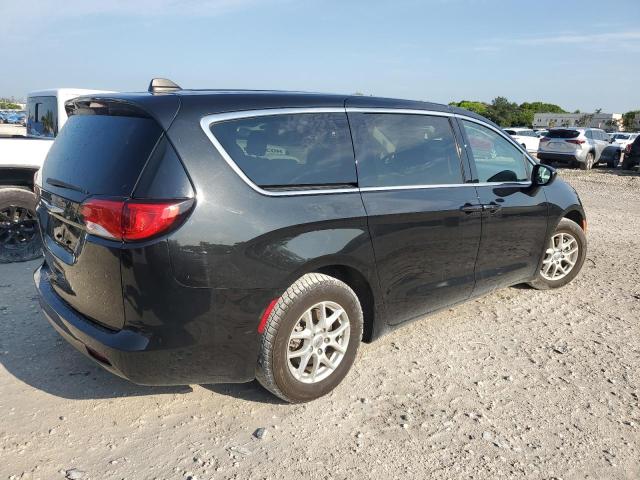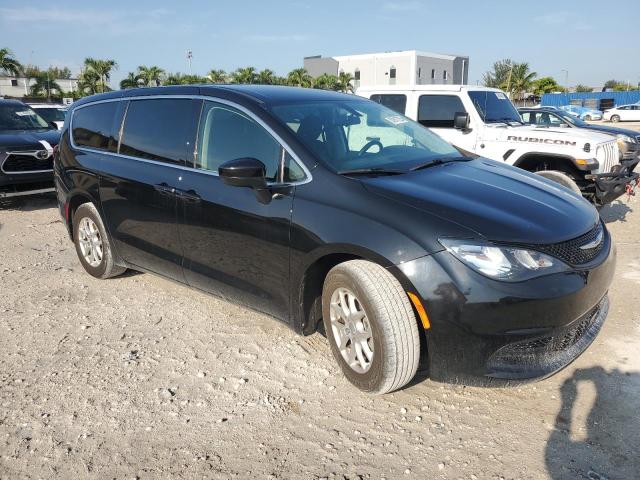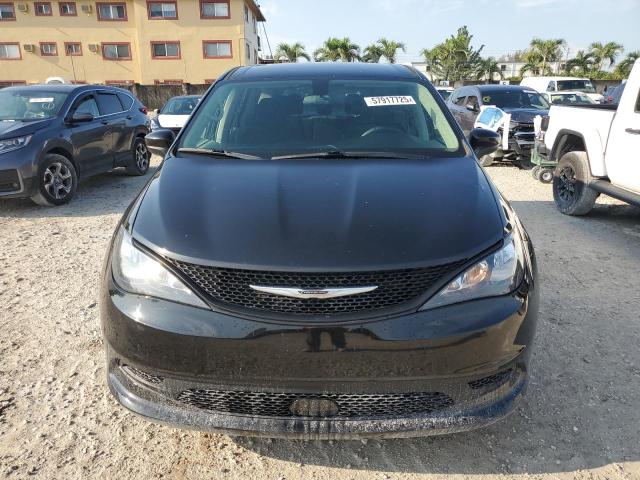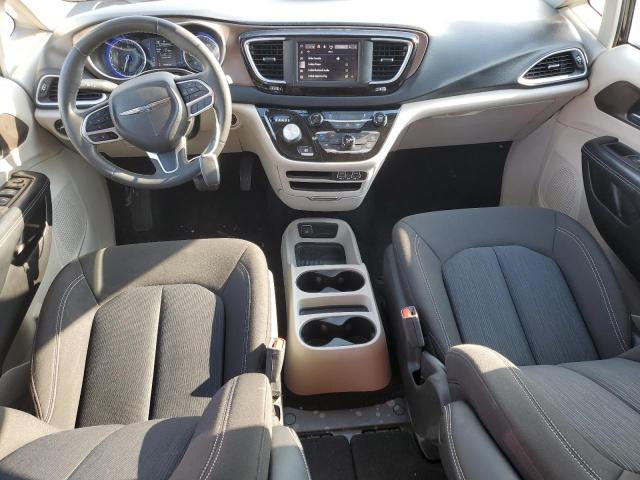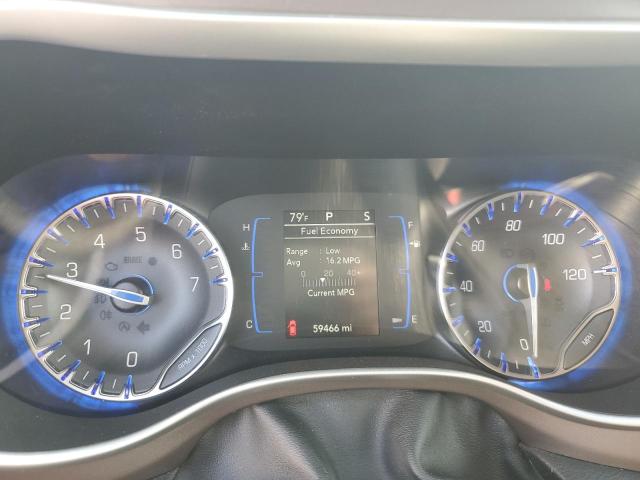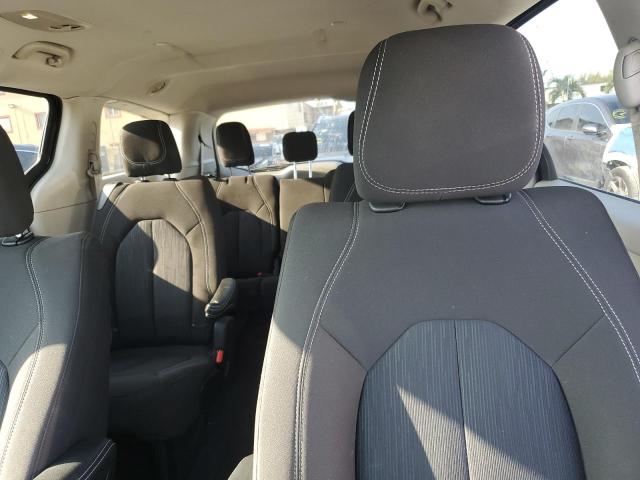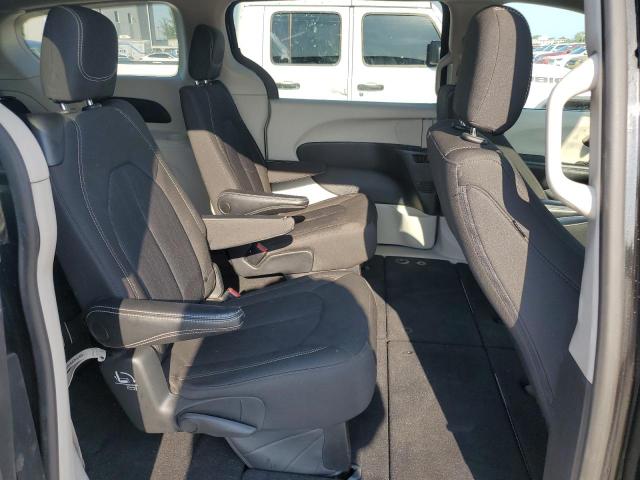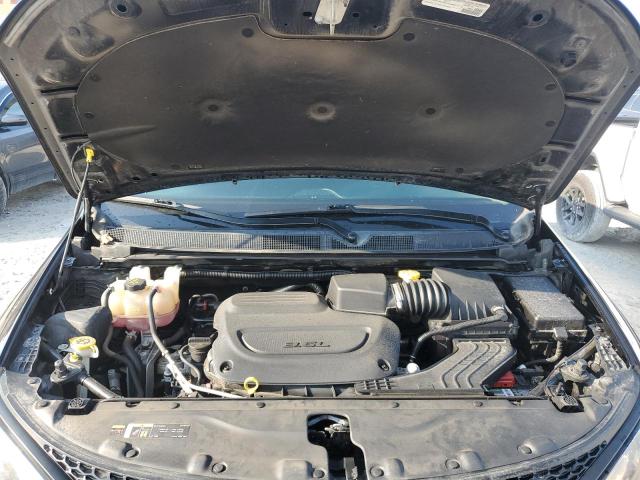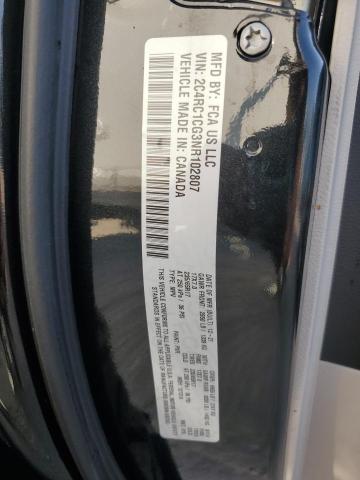2022 CHRYSLER VOYAGER | 2C4RC1CG3NR102807
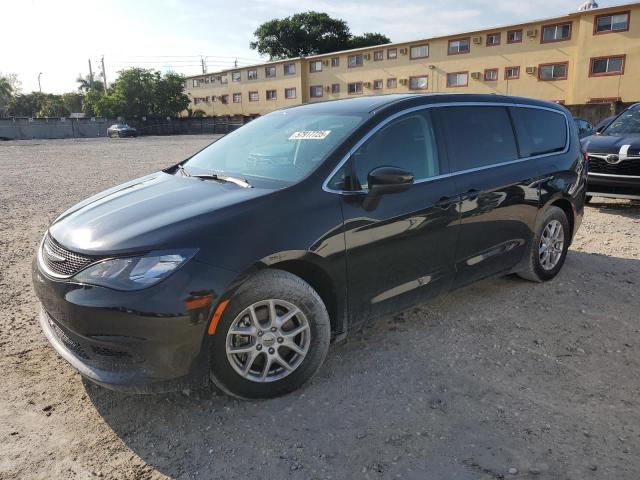 ❯
❯
Specifications
1
~$35,000
Engine: 3.6L naturally aspirated V6 (Pentastar)
Torque: 355 Nm
0–100 km/h: ~7.3 s
Though it’s designed primarily for practicality and fleet usage, the Chrysler Voyager’s 3.6-liter Pentastar V6 engine delivers respectable performance for a minivan, with 355 Nm of torque and a 0–100 km/h time of approximately 7.3 seconds. The powertrain is smooth and responsive, with enough low-end torque to handle full passenger loads or highway merging without strain. The 9-speed automatic transmission shifts predictably and keeps the engine in its optimal powerband under varying conditions.
While not built for high-performance handling, the Voyager’s front strut and rear trailing-arm suspension setup provides decent stability and predictable dynamics in everyday driving. Steering is light but accurate, and the long wheelbase contributes to a composed highway ride. There is little body roll during lane changes, and the vehicle remains planted even with multiple occupants and cargo on board. Chrysler has subtly tuned the platform to balance ride comfort with enough control to avoid the wallowy feel common to some older minivans.
Fundamentally, the Voyager is not a sport-oriented vehicle—but it delivers confident, consistent road manners and a surprisingly willing powertrain. For a family hauler or shuttle vehicle, it offers more driving engagement than its humble badge would suggest.
Body Styles
The Chrysler Voyager is a front-wheel-drive, three-row minivan designed with practical proportions and clean, modern styling. Sharing its body shell and dimensions with the pre-facelift Chrysler Pacifica, the Voyager features a long, low roofline, wide sliding doors, and an upright rear end to maximize interior volume. Its length of over 5.1 meters ensures generous cabin space and a large cargo area, while short overhangs and wide tracks improve stability and maneuverability. The front fascia incorporates Chrysler’s winged badge, flanked by halogen headlamps and a modest mesh grille, giving the Voyager a subdued, fleet-focused aesthetic.
Model Name Meaning (Manufacturer)
The name “Voyager” first appeared in the 1980s under the Plymouth brand and was later used by Chrysler as a minivan badge for export and lower-tier versions. It signifies travel, practicality, and versatility—an identity centered around movement and purpose rather than status or performance.
Model Name Meaning (Languages)
“Voyager” derives from French and English roots, meaning “traveler” or “one who goes on a voyage.” The term evokes a sense of journey, distance, and functionality, which aligns with the model’s role as a people and cargo mover. Its soft phonetics make it accessible in multiple languages, and its literal meaning reinforces the utility-focused nature of the vehicle.
Body & Interior Colors and Rims
The Voyager is offered in a limited but practical color palette that reflects its role as a value-focused family or fleet minivan. Exterior paints include classic tones such as Bright White, Brilliant Black Crystal Pearl, Billet Silver, and Granite Crystal. These neutral shades reduce fleet maintenance costs and help the vehicle maintain a conservative presence in both private and commercial use. There are no premium or multi-stage finishes, keeping the offering streamlined for simplicity and durability.
Inside, the Voyager features stain-resistant cloth upholstery in Black or Toffee/Black two-tone, depending on the trim. The layout prioritizes functionality with hard-wearing plastics and straightforward control placement. Upper dash materials are textured to minimize glare, while chrome trim is minimal to reduce distraction. Second-row bench or captain’s chairs are available, and third-row seats fold flat into the floor for expanded cargo use. Storage cubbies, cupholders, and power outlets are generously distributed throughout the cabin. Although devoid of luxury finishes, the interior is quiet and ergonomic, ideal for high-mileage use.
Wheel options are similarly functional, with standard 17-inch steel wheels covered by silver-painted hubcaps or optional 17-inch aluminum alloys in a basic five-spoke design. Finishes prioritize durability over style, often painted in silver or mid-gray tones that hide brake dust and road grime well. The overall wheel design complements the van’s unpretentious and purpose-driven aesthetic.
Top Expensive Options
- Rear Seat Entertainment Prep Package: $1,100
- 8.4-inch Touchscreen with Uconnect: $900
- Tri-Zone Manual Climate Control: $700
- SafetyTec Group (Rear Park Assist, Blind Spot Monitoring): $1,300
- Power Sliding Side Doors: $1,400
- Second-Row Captain’s Chairs: $800
- Keyless Entry and Remote Start Package: $600
- Full-Length Floor Console: $400
- SiriusXM with 1-Year Subscription: $300
- All-Weather Floor Mats and Cargo Tray Kit: $250
vs Competitors
The Voyager targets a value-conscious segment within the minivan market, competing primarily with lower trims of the Honda Odyssey, Toyota Sienna, and Kia Carnival. While it lacks the hybrid drivetrain of the Sienna or the interior sophistication of the Odyssey, it compensates with a lower base price, strong V6 performance, and Chrysler’s class-leading Stow ‘n Go flexibility in the third row. Against the Kia Carnival, the Voyager offers fewer luxury amenities but remains easier to service and cheaper to operate. As a fleet vehicle or no-frills family hauler, it delivers on the essentials with minimal complexity, which appeals to institutions, large families, and shuttle operators alike.
Fun Fact
The Chrysler Voyager was briefly discontinued for retail customers after 2020, becoming exclusively available to fleet buyers—but demand for affordable, no-nonsense family transportation led to its return to select retail markets in simplified form. It remains one of the few vehicles in the U.S. with a naturally aspirated V6 engine and no hybrid or turbocharged variants—making it an increasingly rare example of classic minivan engineering.
Lot Details
-
Sale Date30/May/2025
-
Lot Number57917725
-
Sale document
-
Location
-
Odometer59,466 miles (95,701 km)
-
Primary Damage:MINOR DENT/SCRATCHES
-
Fuel
-
Engine Type3.6L 6
-
Transmission
-
Drive Type
-
Color
Final Bid Chrysler Voyager (2022)
$15,100
$15,100
$15,100
Specifications
1
~$35,000
Torque:
0–100 km/h:
Though it’s designed primarily for practicality and fleet usage, the Chrysler Voyager’s 3.6-liter Pentastar V6 engine delivers respectable performance for a minivan, with 355 Nm of torque and a 0–100 km/h time of approximately 7.3 seconds. The powertrain is smooth and responsive, with enough low-end torque to handle full passenger loads or highway merging without strain. The 9-speed automatic transmission shifts predictably and keeps the engine in its optimal powerband under varying conditions.
While not built for high-performance handling, the Voyager’s front strut and rear trailing-arm suspension setup provides decent stability and predictable dynamics in everyday driving. Steering is light but accurate, and the long wheelbase contributes to a composed highway ride. There is little body roll during lane changes, and the vehicle remains planted even with multiple occupants and cargo on board. Chrysler has subtly tuned the platform to balance ride comfort with enough control to avoid the wallowy feel common to some older minivans.
Fundamentally, the Voyager is not a sport-oriented vehicle—but it delivers confident, consistent road manners and a surprisingly willing powertrain. For a family hauler or shuttle vehicle, it offers more driving engagement than its humble badge would suggest.
Body Styles
The Chrysler Voyager is a front-wheel-drive, three-row minivan designed with practical proportions and clean, modern styling. Sharing its body shell and dimensions with the pre-facelift Chrysler Pacifica, the Voyager features a long, low roofline, wide sliding doors, and an upright rear end to maximize interior volume. Its length of over 5.1 meters ensures generous cabin space and a large cargo area, while short overhangs and wide tracks improve stability and maneuverability. The front fascia incorporates Chrysler’s winged badge, flanked by halogen headlamps and a modest mesh grille, giving the Voyager a subdued, fleet-focused aesthetic.
Model Name Meaning (Manufacturer)
The name “Voyager” first appeared in the 1980s under the Plymouth brand and was later used by Chrysler as a minivan badge for export and lower-tier versions. It signifies travel, practicality, and versatility—an identity centered around movement and purpose rather than status or performance.
Model Name Meaning (Languages)
“Voyager” derives from French and English roots, meaning “traveler” or “one who goes on a voyage.” The term evokes a sense of journey, distance, and functionality, which aligns with the model’s role as a people and cargo mover. Its soft phonetics make it accessible in multiple languages, and its literal meaning reinforces the utility-focused nature of the vehicle.
Body & Interior Colors and Rims
The Voyager is offered in a limited but practical color palette that reflects its role as a value-focused family or fleet minivan. Exterior paints include classic tones such as Bright White, Brilliant Black Crystal Pearl, Billet Silver, and Granite Crystal. These neutral shades reduce fleet maintenance costs and help the vehicle maintain a conservative presence in both private and commercial use. There are no premium or multi-stage finishes, keeping the offering streamlined for simplicity and durability.
Inside, the Voyager features stain-resistant cloth upholstery in Black or Toffee/Black two-tone, depending on the trim. The layout prioritizes functionality with hard-wearing plastics and straightforward control placement. Upper dash materials are textured to minimize glare, while chrome trim is minimal to reduce distraction. Second-row bench or captain’s chairs are available, and third-row seats fold flat into the floor for expanded cargo use. Storage cubbies, cupholders, and power outlets are generously distributed throughout the cabin. Although devoid of luxury finishes, the interior is quiet and ergonomic, ideal for high-mileage use.
Wheel options are similarly functional, with standard 17-inch steel wheels covered by silver-painted hubcaps or optional 17-inch aluminum alloys in a basic five-spoke design. Finishes prioritize durability over style, often painted in silver or mid-gray tones that hide brake dust and road grime well. The overall wheel design complements the van’s unpretentious and purpose-driven aesthetic.
Top Expensive Options
- Rear Seat Entertainment Prep Package: $1,100
- 8.4-inch Touchscreen with Uconnect: $900
- Tri-Zone Manual Climate Control: $700
- SafetyTec Group (Rear Park Assist, Blind Spot Monitoring): $1,300
- Power Sliding Side Doors: $1,400
- Second-Row Captain’s Chairs: $800
- Keyless Entry and Remote Start Package: $600
- Full-Length Floor Console: $400
- SiriusXM with 1-Year Subscription: $300
- All-Weather Floor Mats and Cargo Tray Kit: $250
vs Competitors
The Voyager targets a value-conscious segment within the minivan market, competing primarily with lower trims of the Honda Odyssey, Toyota Sienna, and Kia Carnival. While it lacks the hybrid drivetrain of the Sienna or the interior sophistication of the Odyssey, it compensates with a lower base price, strong V6 performance, and Chrysler’s class-leading Stow ‘n Go flexibility in the third row. Against the Kia Carnival, the Voyager offers fewer luxury amenities but remains easier to service and cheaper to operate. As a fleet vehicle or no-frills family hauler, it delivers on the essentials with minimal complexity, which appeals to institutions, large families, and shuttle operators alike.
Fun Fact
The Chrysler Voyager was briefly discontinued for retail customers after 2020, becoming exclusively available to fleet buyers—but demand for affordable, no-nonsense family transportation led to its return to select retail markets in simplified form. It remains one of the few vehicles in the U.S. with a naturally aspirated V6 engine and no hybrid or turbocharged variants—making it an increasingly rare example of classic minivan engineering.



